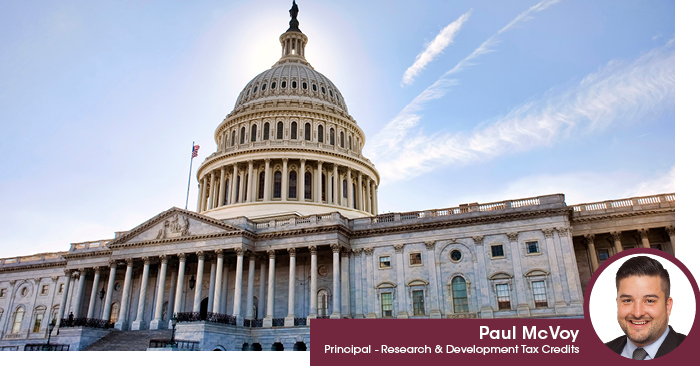Follow KBKG on Social Media
By Paul McVoy | Principal, Research & Development Tax Credits
The reconciliation process for the “One Big Beautiful Bill” (OBBB) has entered its final phase, and in the past three days, Senate Republicans cleared a key procedural hurdle and released updated text that could reach the Senate floor as soon as June 30, 2025. With Senate Majority Leader John Thune (R-SD) vowing to keep the Senate in session through Independence Day if needed, leadership is still targeting final passage by July 4, 2025.
Latest Tax Highlights
- SALT Work-Arounds Preserved – Both the House-passed bill’s service-based SALT carve-out and the original Senate draft’s 50 percent reduction for PTETs are gone. The updated text retains full deductibility of state and local taxes paid through state-enacted pass-through entity taxes in over 30 states, a critical win for real estate partnerships and other pass-through businesses.
- Section 899 “Retaliatory Tax” Eliminated – The updated bill fully drops the controversial Section 899 retaliation measures that would have chilled foreign investment in United States real estate.
- Excess Business Losses Softened – The revised bill drops plans to permanently silo active pass-through losses from wages and investment income.
- R&D 174 Expensing Restored (with Retroactivity for Small Business) – The Senate’s latest draft repeals the TCJA’s R&D amortization requirement and reestablishes 100 percent immediate expensing for domestic research costs. Businesses with average gross receipts of $31 million or less over the prior three years can elect retroactively back to 2022, through a change-in-accounting-method election or amended returns.
- Section 179D Deduction Deadline – The energy-efficient commercial buildings deduction (179D) now terminates for properties beginning construction after June 30, 2026, tightening the original “12 months after enactment” sunset and providing certainty to project timelines.
- Section 45L Home Credit Deadline – Mirroring 179D, the new home energy-efficiency credit under Section 45L sunsets for residences with construction commencing after June 30, 2026.
- ITC/PTC Deadlines under Sections 45Y & 48E – Rather than simply “begin construction by,” the updated text requires all wind (45Y) and solar (48E) projects to be placed in service by December 31, 2027, to qualify for their respective credits. Under the prior draft, breaking ground by year-end 2027 would have sufficed.
- Condominium Construction Tax Accounting Reform – Developers can now elect the completed-contract method for presold condo projects, relieving them of “phantom income” under the percentage-of-completion method.
Some provisions remain in flux. The Opportunity Zone program is made permanent—a plus for community-investment planning—but gains invested through 2026 face a shorter deferral, which could dampen new capital flows until 2027. Several clean-energy credits, including advanced manufacturing incentives and clean vehicle credits, are subject to accelerated phase-outs that will warrant close scrutiny during the final amendment vote.
Looking Ahead
With updated text in hand and a procedural vote secured, the Senate aims for final passage on June 30, 2025. If the bill clears on a simple majority—as leadership expects—it moves to the House, where Republicans will be under intense pressure to reconcile any differences and deliver it to the President before July 4, 2025. Failure to meet that date risks funding gaps or a government shutdown, though Senate leaders insist they’ll keep the chamber open as long as needed.
For years, KBKG has remained ahead of legislative changes to better assist clients and businesses by navigating them through various tax policies. For more information about how OBBB can impact your business, contact a KBKG expert today.
About the Author
Paul McVoy | Principal – Research & Development Tax Credits
Paul McVoy is a Principal for KBKG’s Tax Credit Consulting practice. In this role, Paul devotes his time to consulting companies in maximizing their R&D tax credit claims. Prior to joining KBKG, Paul was a manager at a Big Four accounting firm out of the Philadelphia, San Diego, and Los Angeles offices. Paul McVoy has spent nearly 20 years in public accounting, leveraging previous tax compliance… Read More



